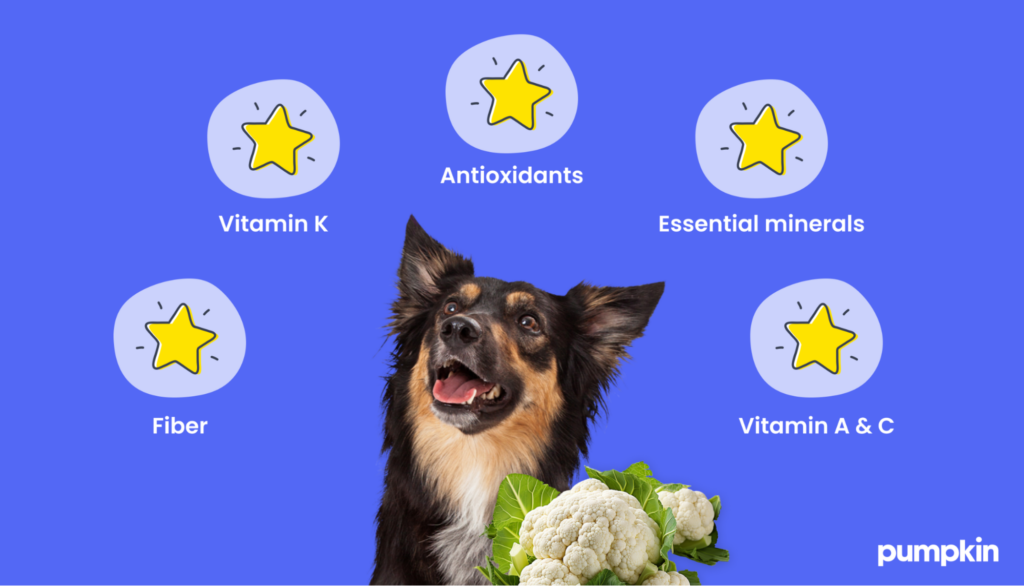Key Points:
- Yes, dogs can eat cauliflower in moderation, either raw or cooked. Overconsumption can cause gas and bloating.
- Cauliflower is a source of dietary fiber, vitamin K, and vitamin C for dogs.
- Avoid giving your dog cauliflower with seasonings or oils, as they can cause an upset stomach.
Cauliflower is one of those veggies we either love or hate. In some households, you’ll find this cousin of broccoli fed to dogs under the table by kids who don’t care for its bland taste.
But is this sneaky move okay for your pup? Can dogs eat cauliflower safely?
Yes, dogs can have cauliflower, and it’s a healthy treat when served in moderation. But (and there’s always a “but” with doggy diets), there are a few small risks to keep in mind before you let your dog dig into your veggie platter.
Here’s everything you need to know about feeding cauliflower to your pooch.
Feeding cauliflower to dogs
Cauliflower is a healthy, low-calorie snack full of vitamins, fiber, and antioxidants that support your dog’s overall health.
However, it’s important to serve it plain — without any butter, salt, or spices — and in small amounts to avoid causing gas or an upset stomach. Always introduce new foods gradually and monitor your dog for any bad reactions.
Vegetable allergies in dogs are rare. If your dog doesn’t react well to cauliflower, it’s more likely to be an adverse food reaction (AFR) from introducing a new type of food.
Health benefits of cauliflower for dogs
Packed with vitamins, fiber, and antioxidants, cauliflower is a surprisingly healthy and crunchy snack for your pup. A human-sized serving (about 3.5 ounces) contains just 25 calories, and it delivers a ton of fiber and vitamins without any wasted calories.
Cauliflower also contains healthy nutrients such as:

Fiber: Fiber keeps your dog’s digestive system healthy — and cauliflower has a lot of fiber. Insoluble fiber doesn’t dissolve in water, so it remains intact as it travels through the intestines. As it travels through, it pulls all the other waste along with it, reducing the incidence of stomach issues, constipation, and diarrhea.
Vitamin K: This fat-soluble vitamin contains prothrombin, a protein essential for blood clotting and bone metabolism. Vitamin K also helps regulate blood calcium levels.
Antioxidants: Cauliflower is a high achiever in the antioxidant category. Antioxidants protect your dog’s health by fighting against free radicals that cause cell damage. They also provide some important age-related and cognitive benefits.
Vitamin C, vitamin A, beta-carotene, and folate: These are potent antioxidants that provide anti-inflammatory properties and boost your dog’s immune system.
Glucosinolates and isothiocyanates: These phytonutrients have a host of benefits for your dog’s brain, heart, and immune system.
Choline: This essential nutrient is in abundance in cauliflower. It detoxes the liver and supports cognitive function and behavior.
Minerals: Potassium, calcium, magnesium, and manganese are some of the essential minerals found in cauliflower.
Cautions about cauliflower
Although no part of the cauliflower plant is toxic to your dog, this veggie is very fibrous and can cause choking hazards. This is especially true for small dogs and puppies.
Cauliflower’s high fiber content can also cause an upset stomach or gastrointestinal discomfort in large amounts. This is true for all high-fiber vegetables and fruits.
Finally, like other cruciferous veggies, cauliflower contains isothiocyanates. These compounds can cause gas in dogs, so if your dog chomps down too much cauliflower at once, don’t be surprised if room-clearing doggy farts soon follow.
How to prepare cauliflower for dogs
In a few simple steps, cauliflower can become a healthy treat for your dog. Here’s how to safely prepare this veggie for your dog.
1. Wash thoroughly. Rinse the cauliflower under running water to remove dirt, pesticides, or contaminants.
2. Cut into small pieces. Cut the stems and edible florets into small pieces, as you do for all raw vegetables and fruits. This will reduce the risk of any gastrointestinal side effects and prevent choking hazards.
3. Cook for easier digestion. You can steam or boil cauliflower. Just remember to avoid excess oils or adding butter, salt, or spices. In particular, never add onion or garlic (including powders), as they can damage your dog’s red blood cells and cause anemia.
4. Serve raw (optional): If you’re going the raw route, feed your dog raw cauliflower in small bites to avoid digestive issues. Treat it as an occasional snack, not a daily food, and avoid adding it to their regular meals more than once a week.
5. Serve in moderation. To avoid stomach upset and gas, gradually introduce cauliflower to your dog’s diet. Start with a few small pieces, then increase the amount per serving if there are no signs of stomach or intestinal problems.
More fruit and veggie treats for dogs
It’s always a good idea to give your dog a variety of healthy snacks. Along with cauliflower, here’s a list of dog-friendly foods you can share in moderation.
- Green beans
- Apples
- Blueberries
- Sweet potatoes
- Pumpkin
- Cranberries
- Spinach
- Peas
- Cucumbers
- Watermelon
- Mangoes
- Pears
- Bananas
- Strawberries
- Pineapple
Remember to follow the 90/10 rule for your dog’s diet. Treats should make up no more than 10% of your dog’s daily calories, with the rest coming from their regular, balanced meals.
Of course, dogs don’t always ask permission before helping themselves to a snack. Our pups can get themselves into all sorts of mischief, and you never know when an injury or accident will occur. A Pumpkin Dog Insurance plan can help cover the costs of eligible vet bills in the future, giving you peace of mind when the unexpected happens.
FAQs
-
- https://www.sciencedirect.com/science/article/abs/pii/S1090023318301321
- https://pmc.ncbi.nlm.nih.gov/articles/PMC3793502/
- https://pmc.ncbi.nlm.nih.gov/articles/PMC7926526/
- https://www.cancer.gov/about-cancer/causes-prevention/risk/diet/antioxidants-fact-sheet
- https://www.sciencedirect.com/science/article/abs/pii/S147149141200055X
- https://health.clevelandclinic.org/choline-foods
- https://www.fda.gov/food/nutrition-food-labeling-and-critical-foods/nutrition-information-raw-vegetables




